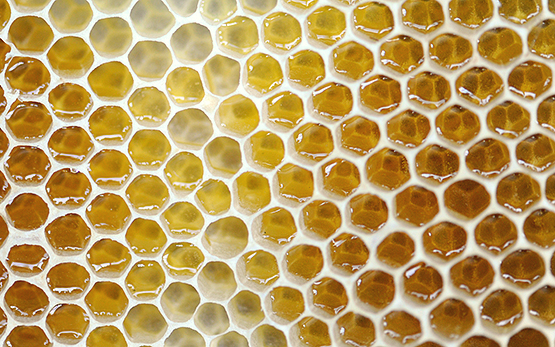Der Wassergehalt des von den Pflanzen produzierten Nektars kann variieren. Um seine Konservierung in den Waben zu gewährleisten, darf er nicht gären. Deshalb wird er von den Bienen in Honig umgewandelt, indem sie seinen Wassergehalt senken und folglich den Zuckergehalt erhöhen. Dies verhindert die Entwicklung der Mikroorganismen. In der Dunkelheit des Bienenstocks ist es schwierig, den Herstellungsprozess des Honigs zu beobachten. Aus diesem Grund ist er auch nur wenig erforscht. Um die Umwandlung von Nektar in Honig zu untersuchen, haben wir die Technik der Tomographie eingesetzt. Sie ermöglicht es, den Zuckergehalt des eingelagerten Nektars sehr präzise zu messen, ohne den Bienenstock öffnen zu müssen und das Bienenvolk zu stören.

Publications Sonja Marit Paul
Wüst-Galley C., Paul S. M., Leifeld J.
Accounting for greenhouse gas emissions from Switzerland's farmed transition soils.
Agroscope Science, 215, 2025, 1-9.
Paul S. M., Gschwend F., Nohl S., Wüst C., Jocher M., Schölmerich M., Szidat S., Leifeld J., Ammann C.
Paddy Rice Cultivation as GHG Mitigation Option in Organic Soils: RiceClim Project.
In: Status of the Swiss Carbon Cycle. 5. June, Publ. ETH Zürich, Zürich (CH). 2025.
Widmer A., Tamagni L., Wüst C., Paul S. M., Volpe V., Jocher M., Dötterl S., Keller T., Leifeld J.
Reduced GHG emission by paddy rice cultivation on organic soils in a mesocosm experiment.
In: Status of Swiss Carbon Cycle Symposium. 5 June, Publ. ETH Zürich, Zürich (CH). 2025.
Leifeld J., Paul S. M., Gross-Schmölders M., Wang Y., Wüst-Galley C.
Crediting peatland rewetting for carbon farming: Some considerations amidst optimism.
Mitigation and Adaptation Strategies for Global Change, 30, 2025, Article 13.
Paul S. M., Ammann C., Wang y., Alewell C., Leifeld J.
Can mineral soil coverage be a suitable option to mitigate greenhouse gas emissions from agriculturally managed peatlands?
Agriculture, Ecosystems & Environment, 375, 2024, 1-11.
Widmer A., Tamagni L., Wüst C., Paul S. M., Volpe V., Jocher M., Giger R., Dötterl S., Keller T., Leifeld J.
Mitigating greenhouse gas emissions from managed organic soils in the temperate zone by paddy rice cultivation.
In: EGU General Assembly 2024. 14-19 April, Publ. European Geosciences Union (EGU), Vienna (AT). 2024, 1.
Wüst C., Heller S., Ammann C., Paul S. M., Doetterl S., Leifeld J.
Methane and nitrous oxide emissions from rice grown on organic soils in the temperate zone.
Agriculture, Ecosystems & Environment, 356, 2023, 1-9.
Wang Y., Paul S. M., Alewell C., Leifeld J.
Reduced nitrogen losses from drained temperate agricultural peatland after mineral soil coverage.
Biology and Fertility of Soils, 59, 2023, 153-165.
Paul S. M., Leifeld J.
Management of organic soils to reduce soil organic carbon losses.
In: Understanding and fostering soil carbon sequestration. 07.11.2022, Publ. C. Rumpel, Burleigh Dodds Science Publishing. 2023, 617-680.
Wang Y., Paul S. M., Jocher M., Alewell, C., Leifeld J.
Reduced nitrous oxide emissions from drained temperate agricultural peatland after coverage with mineral soil.
Frontiers Environmental Science, 10, 2022, Article 856599.
Wang Y., Paul S. M., Jocher M., Espic C., Alewell C., Szidat S., Leifeld J.
Soil carbon loss from drained agricultural peatland after coverage with mineral soil.
Science of the Total Environment, 800, 2021, Article 149498.
Leifeld J., Alewell C., Paul S. M.
Accumulation of C4-carbon from Miscanthus in organic-matter-rich soils.
Global Change Biology Bioenergy, 13, (8), 2021, 1319-1328.
Paul S. M., Ammann C., Alewell C., Leifeld J.
Carbon budget response of an agriculturally used fen to different soil moisture conditions.
Agricultural and Forest Meteorology, 300, 2021, 1-11.






